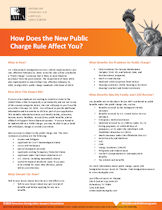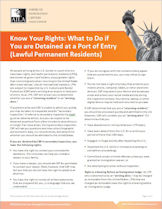New Public Charge Rule – How Does It Affect You
What is New
U.S. Citizenship & Immigration Services (USCIS) implemented a new rule, effective February 24, 2020, to decide who will be considered a “Public Charge” (someone that is likely to need financial assistance from the government). The Department of State (DOS) also implemented an interim final rule, effective February 24, 2020, to align DOS’s public charge standards with those of USCIS.
How Does This Impact You
If you or your employee are seeking to remain or come to the United States either temporarily or permanently and are not in one of the exempt categories below, the rule will apply to you if you file on or after February 24, 2020. You will need to provide additional information and documents to USCIS as part of your application. This includes information about your health, family, education, income, assets, liabilities, receipt of any public benefits, and an Affidavit of Support from a financial sponsor. If you are found to be inadmissible as a Public Charge, you may be able to pay a bond and still adjust, change or extend your status.
Not everyone is subject to the public charge rule. The most common exceptions are the following:
- Asylees and Refugees
- Applicants for U or T Nonimmigrant Status
- VAWA Self-Petitioners
- Special Immigrant Juveniles
- Applicants seeking Temporary Protected Status
- Applicants under the Cuban Adjustment Act
- U.S. citizens, including naturalized citizens
- Lawful Permanent Residents (note: if you plan to be abroad for more than 180 days, please talk to your attorney)
What Should You Do Now?
Talk to your lawyer about how the new rule affects you.
- Talk to your lawyer about any past receipt of benefits and before applying for any new benefits.
What Benefits Are Problems for Public Charge?
- Cash Assistance for Income Maintenance (includes TANF, SSI, and federal, state, and local assistance programs)
- SNAP or Food Stamps
- Medicaid (with exceptions listed below)
- Housing Assistance (Public Housing or Section 8 Housing Vouchers and Rental Assistance)
What Benefits May You and Your Family Still Receive?
Any benefits not on the above list are NOT considered as public
benefits under the public charge rule, such as:
- Benefits received by the immigrant’s family members
- Benefits received by U.S. Armed Forces Service Members
- Emergency medical assistance
- Medicaid received by (1) children under 21; (2) during pregnancy or within 60 days of pregnancy; or (3) under the Individuals with Disabilities Education Act (IDEA).
- Heath Insurance under the Affordable Care Act
- Social Security and Medicare
- WIC
- CHIP
- Energy Assistance (LIHEAP)
- Pell grants and student loans
- Worker’s Compensation or Unemployment Benefits
- Tax-related cash benefits
Questions About Public Charge? Contact An Experienced Immigration Lawyer
If you or a family member have any questions about public charge and how the new public charge rule affects you, it is important to speak with a qualified immigration lawyer. Call immigration attorney Jessie M. Thomas at (214) 838-0045 or submit your questions online at www.staylegally.com/contact/ .
Printable Factsheet To Help You Understand How The New Public Charge Rule Affects You
View online, download, or print and share with others
How Does the New Public Charge Rule Affect You?



 The list recognizes the significant achievements of those attorneys whose practice elevates the standards of their State’s Bar as well as provided a benchmark for other practitioners. The list encompasses industry leaders who have been featured on networks such as ABC, NBC, CBS, MSNBC, FOX, the New York Times, The Washington Post, Time and Newsweek.
The list recognizes the significant achievements of those attorneys whose practice elevates the standards of their State’s Bar as well as provided a benchmark for other practitioners. The list encompasses industry leaders who have been featured on networks such as ABC, NBC, CBS, MSNBC, FOX, the New York Times, The Washington Post, Time and Newsweek.